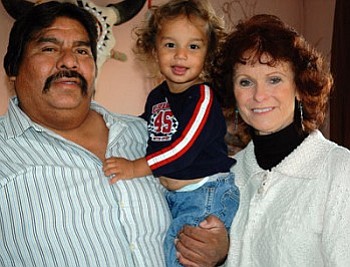Cherokee Nation foster parenting program makes a difference for life
TAHLEQUAH, Okla.-It's the most wonderful time of the year to open your heart and your home to a child in need, by becoming a Cherokee Nation foster parent.
"Every child deserves the safety and security of a loving home," said Chad Smith, Principal Chief of the Cherokee Nation. "If there is a place in your life to help care for a child placed with Indian Child Welfare (ICW), I really encourage you to consider making a difference in that child's life by becoming a foster parent."
The ICW Foster Care Program was designed to place children who have been neglected or abused in temporary homes. ICW's ultimate goal is to provide a safe and permanent home to tribal children who are unable to be cared for by their biological family.
"Our need for foster homes is mainly within the jurisdictional area of the Cherokee Nation and throughout the state of Oklahoma," said Ellen Guttillo, Child Welfare Specialist II. "It is our responsibility to make sure that our Native American children are in foster homes that are compliant with the Indian Child Welfare Act. Therefore, our need for foster homes is an ongoing challenge."
Angel Smith, Cherokee Nation Assistant Attorney General, knows first-hand the difference foster care can make in a child's life and future. Smith was placed in foster care when she was just a toddler. Today, she gives back to the program and the people that impacted her life by becoming a foster parent.
"The memories of being a foster child are so incredibly complicated that as a child you can't really comprehend everything that is happening around you and inside you," said Smith. "Being a foster child can be one of the hardest experiences anyone can ever face. In all sincerity, the importance of a good foster family may be the deciding factor in the future life direction of a child in foster care."
Smith credits her foster parents and grandparents for the unified front of support that was offered to her when she needed it most, and believes her experiences are what led her to become a foster parent as an adult.
"One of the most incredible things about being a foster parent is seeing the positive steps you help your foster child take for themselves," said Smith. "It may be something small, like a child saying something nice to a sibling or picking up their room, but it's a feeling that can't be described."
Cathy and Leroy Sanders, of Carney, Okla., became involved in foster care because they wanted to make a difference. Currently, the Sanders family has three tribal children in their care, all three are under five and one was officially adopted by the family in June of this year. In addition, they have cared for two African American girls for several years through the state's foster care program.
"It doesn't matter to us what race a child is or what may be wrong with them" said Leroy Sanders. "If we have room, we just take them in and love them."
The Sanders know that one of the hardest parts of being a foster parent is giving a child up, but they also understand that reuniting families is what ICW is allabout.
"It's hard for us when a child leaves our home," said Sanders. "We love them like they are our very own. To us, as long as they are taken care of, that's all that really matters. We have a crying tree in the backyard and we've both leaned on that tree a few times. But, we understand that's part of the process. When a child is returned to their home, we pat each other on the back and say 'we won one.'"
To become a Cherokee Nation foster parent, applicants must be at least 21 years of age and be of Native American descent with a CDIB card. Participants can be married or single and must be willing to participate in a comprehensive home study. Background checks are conducted.
"It's also important that applicants be in good health, have adequate space in their home and a steady source of income," said Gutillo. "In addition, it is vitally important that applicants have the ability to love, respect, nurture, protect and parent the children."
Cathy Sanders realizes that she and her husband were probably unusual candidates to be foster parents. However, she believes that being a foster parent is wonderful therapy for anyone with empty nest syndrome.
"We have children and grandchildren," said Sanders. "They sometimes think we're crazy for taking on so much, but this is fulfilling to us."
According to Smith, realistically, being a foster parent is a very challenging experience but one with benefits that cannot be measured.
"The greatest of all benefits," said Smith, "is the benefit to our tribal children who have a supportive and loving foster home that offers them direction in a time of their life when they may need it the most. One day our tribal children will become the Cherokee Nation and their voice will be the voice of the tribe. What greater opportunity do we have than to help them become the very best of what they can be?"
According to ICW statistics, there are approximately 90 Cherokee children in the custody of the Cherokee Nation and more than 700 Cherokee children in the custody of the state of Oklahoma. In addition, another 300 Cherokee children are in foster care outside of Oklahoma.
"If you have a love for children and a desire to make a difference, I encourage you to consider becoming a Cherokee Nation foster parent. The need is great and the rewards are endless," said Guttillo.
For more information about this program, call (918) 431-4115.
SUBMIT FEEDBACK
Click Below to:




